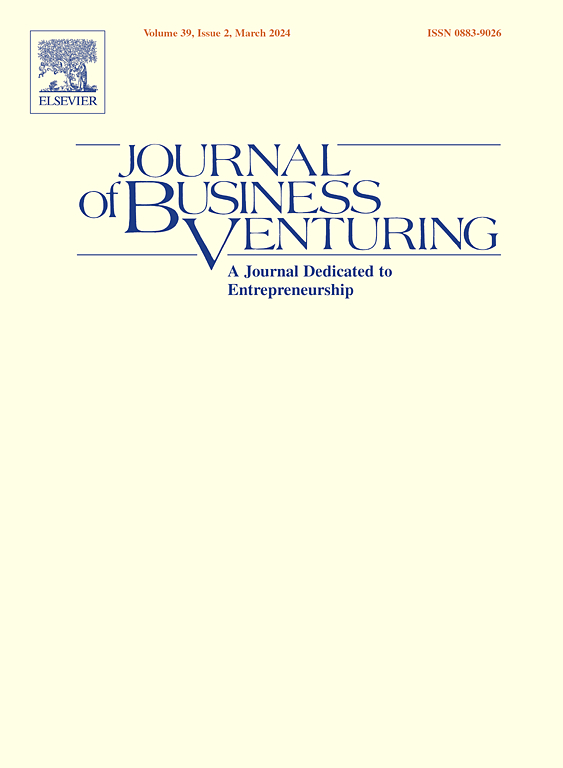The expectations game: The contingent value of hype as a rhetorical strategy in resource mobilization processes among AI startups
IF 8.9
1区 管理学
Q1 BUSINESS
引用次数: 0
Abstract
Technology startups confront a critical dilemma when attempting to use hype to mobilize resources under conditions of extreme uncertainty. While some scholars argue that high levels of hype play a key role in securing resources to fund startup growth, others caution that the excessive use of hype risks triggering investor skepticism, thereby undermining the extent to which investors judge a startup's claims to be plausible. To assess the validity of these competing conceptions, we analyze 302 artificial intelligence startups across 880 financing rounds using a combination of established econometric methods and emerging machine learning techniques. Our findings reveal the presence of an inverted U-shaped relationship between hype and resource mobilization, wherein investor valuations increase with hype up to a critical threshold, beyond which further hype diminishes valuation outcomes. Moreover, our analysis shows that factors enhancing the comprehensibility and credibility of hype partially offset its diminishing returns, flipping high levels of hype from a liability into an asset that improves startup valuations. Our novel theorization reconciles the performative and pejorative views of hype by demonstrating that hype's impact is contingent upon both its magnitude and the factors influencing investor plausibility judgments. In addition to materially enhancing the methodological toolbox used to assess startup rhetoric under uncertainty, our approach also provides important insights for entrepreneurship research attendant to the strategic management of visionary claims, especially when start-ups attempt to balance investor enthusiasm with realistic expectations in emergent technology sectors.
期望游戏:在人工智能初创公司的资源动员过程中,炒作作为一种修辞策略的偶然价值
在极度不确定的情况下,科技初创公司在试图利用炒作来调动资源时,面临着一个关键的困境。虽然一些学者认为,高水平的炒作在确保初创公司成长所需的资源方面发挥着关键作用,但也有人警告说,过度使用炒作可能会引发投资者的怀疑,从而削弱投资者对初创公司声称的合理性的判断程度。为了评估这些相互竞争的概念的有效性,我们结合了现有的计量经济学方法和新兴的机器学习技术,分析了880轮融资中的302家人工智能初创公司。我们的研究结果揭示了炒作与资源调动之间存在倒u型关系,其中投资者估值随着炒作达到一个关键阈值而增加,超过该阈值后,进一步的炒作会降低估值结果。此外,我们的分析表明,提高炒作的可理解性和可信度的因素部分抵消了其递减的回报,将高水平的炒作从负债转变为提高初创公司估值的资产。我们的新理论通过证明炒作的影响取决于其大小和影响投资者合理性判断的因素,调和了炒作的表现性和贬损性观点。除了实质性地增强了用于评估不确定性下创业修辞的方法论工具箱之外,我们的方法还为创业研究提供了重要的见解,这些研究伴随着有远见的主张的战略管理,特别是当初创企业试图在新兴技术领域平衡投资者的热情和现实的期望时。
本文章由计算机程序翻译,如有差异,请以英文原文为准。
求助全文
约1分钟内获得全文
求助全文
来源期刊

Journal of Business Venturing
BUSINESS-
CiteScore
16.70
自引率
6.90%
发文量
59
审稿时长
77 days
期刊介绍:
The Journal of Business Venturing: Entrepreneurship, Entrepreneurial Finance, Innovation and Regional Development serves as a scholarly platform for the exchange of valuable insights, theories, narratives, and interpretations related to entrepreneurship and its implications.
With a focus on enriching the understanding of entrepreneurship in its various manifestations, the journal seeks to publish papers that (1) draw from the experiences of entrepreneurs, innovators, and their ecosystem; and (2) tackle issues relevant to scholars, educators, facilitators, and practitioners involved in entrepreneurship.
Embracing diversity in approach, methodology, and disciplinary perspective, the journal encourages contributions that contribute to the advancement of knowledge in entrepreneurship and its associated domains.
 求助内容:
求助内容: 应助结果提醒方式:
应助结果提醒方式:


